|
|
|
Sort Order |
|
|
|
Items / Page
|
|
|
|
|
|
|
| Srl | Item |
| 1 |
ID:
061010
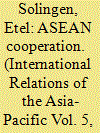

|
|
|
| 2 |
ID:
047213


|
|
|
|
|
| Publication |
Singapore, Institute of Defence and Strategic Studies, 2001.
|
| Description |
37p.
|
| Series |
No. 16
|
|
|
|
|
|
|
|
|
|
|
|
Copies: C:1/I:0,R:0,Q:0
Circulation
| Accession# | Call# | Current Location | Status | Policy | Location |
| 044930 | 341.2473/SOL 044930 | Main | On Shelf | General | |
|
|
|
|
| 3 |
ID:
134087
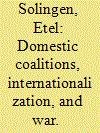

|
|
|
|
|
| Publication |
2014.
|
| Summary/Abstract |
Recent commentary on the centenary of World War I evokes similarities between Germany then and China now, and between globalization then and now. The nature of dominant coalitions in both countries provides a conceptual anchor for understanding the links between internal and external politics in 1914 and 2014. Coalitional dynamics draw greater attention to agency in debates that all too often emphasize structure, impersonal forces, and inevitability. Two core claims rest on this basic analytical building block. First, despite apparent similarities in domestic coalitional arrangements of putative revisionist challengers-Germany and China-important differences defy facile analogies. China now is not Germany then. Second, the regional coalitional cluster and the global political economy-and hence the links between domestic and external politics-differ across the two periods. The "world-time" against which coalitions operate today is significantly different as well. Thus ahistorical analogies between then and now may not only be imperfect; they can infuse actors with misguided and perilous protocols for international behavior. There is plenty that may recall World War I today but even more that does not, and all must make sure that gap never narrows.
|
|
|
|
|
|
|
|
|
|
|
|
|
|
|
|
| 4 |
ID:
082464
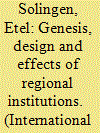

|
|
|
|
|
| Publication |
2008.
|
| Summary/Abstract |
Why do regional institutions emerge, what accounts for their variation in design, and what are their effects? Several conceptual and epistemological perspectives-neorealism, neoliberal-institutionalism, constructivism, and domestic politics-provide competing and complementary answers to these questions. I focus on regional organizations as productive arenas for developing contingent propositions on institutions more generally. The purpose is to advance cross-paradigmatic dialogue in two ways: through sensitivity to scope conditions and to institutional genesis, forms, and effects, in an effort to transcend axiomatic debates that often conflate different dependent variables. The empirical analysis includes the Association of Southeast Asian Nations (ASEAN), Asia-Pacific Economic Cooperation (APEC), ASEAN Regional Forum (ARF) and the Arab League. The main findings from these cases suggest that understanding the nature of dominant domestic coalitions is often crucial for explaining incentives to create, design, and fine-tune the effects of institutions. However, this is mainly the case when the consequences of creating or designing institutions for power distribution, transaction costs, and norms are negligible or hard to estimate. In many cases these consequences are sizeable, reducing the explanatory influence of domestic coalitions. The latter often provide no more than permissive conditions for the emergence, design, and effect of institutions. Their influence is most decisive in explaining institutional genesis but is often underdetermining in explaining their design
|
|
|
|
|
|
|
|
|
|
|
|
|
|
|
|
| 5 |
ID:
133749


|
|
|
|
|
| Publication |
2014.
|
| Summary/Abstract |
International and transnational diffusion have always been an important dimension of international studies but only recently has attention shifted from the nuts and bolts of whatever it is that diffuses (technology, policies, ideas, services, values, institutions, power, people, emotions, and much more) to a more self-conscious effort to conceptualize diffusion itself. As the theme of the 2013 ISA Convention in San Francisco, a large number of panels addressed diffusion explicitly in novel and interesting ways. This symposium presents a very small subset of an intellectually impressive and multifaceted program that featured the association's diversity.
|
|
|
|
|
|
|
|
|
|
|
|
|
|
|
|
| 6 |
ID:
080239
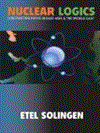

|
|
|
|
|
| Publication |
Princeton, Princeton University Press, 2007.
|
| Description |
xiii, 406p.
|
| Series |
Princeton studies in international hisotry and politics
|
| Standard Number |
9780691134680
|
|
|
|
|
|
|
|
|
|
|
|
Copies: C:1/I:0,R:0,Q:0
Circulation
| Accession# | Call# | Current Location | Status | Policy | Location |
| 053072 | 355.0217095/SOL 053072 | Main | On Shelf | General | |
|
|
|
|
| 7 |
ID:
118167
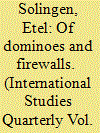

|
|
|
|
|
| Publication |
2012.
|
| Summary/Abstract |
The Great Recession, Euro contagion, Middle East upheavals, nuclear proliferation, and expansion of rights, among others, highlight the centrality of diffusion to international studies. This Presidential Address outlines building blocks for a shared conceptualization of diffusion that is attentive to the initial stimulus; the medium through which information about the stimuli may/may not travel to other destinations; the political agents un/affected by the stimulus' positive or negative externalities, who aid or block the stimulus' journey to other destinations; and outcomes that enable discrimination among grades of diffusion and resulting equilibria. Various issue areas illustrate how initial stimuli may/may not change preferences, transform identities, trigger emotions, alter strategic choices, and affect outcomes. I advance three related considerations. First, to avoid selection bias, understanding what does not diffuse (the "Vegas counterfactual") should be as central as what does. Concepts such as firewalls and sedimentation are essential for gauging a medium's relative immunity/vulnerability to diffusion. Second, weaving domestic, regional, and global considerations into a single analytical framework reduces omitted variable bias and enables systematic cross-regional comparisons. Third, these building blocks imbue the study of diffusion with political dynamics-entailing strategic interaction, contingency, incomplete information, and unintended effects-that defy determinism, automaticity, or teleology. Similar causal mechanisms may yield different outcomes under different domestic, regional, and global conditions. And different mechanisms may yield similar outcomes under comparable circumstances. I highlight the challenges inherent in assessing the outcomes of diffusion given competing empirical findings, epistemologies, and normative readings of what does/does not and should/should not diffuse, and outline an agenda for future research.
|
|
|
|
|
|
|
|
|
|
|
|
|
|
|
|
| 8 |
ID:
051971


|
|
|
|
|
| Publication |
Mar-Apr 2004.
|
|
|
|
|
|
|
|
|
|
|
|
|
|
|
|
|
|
|
|
|